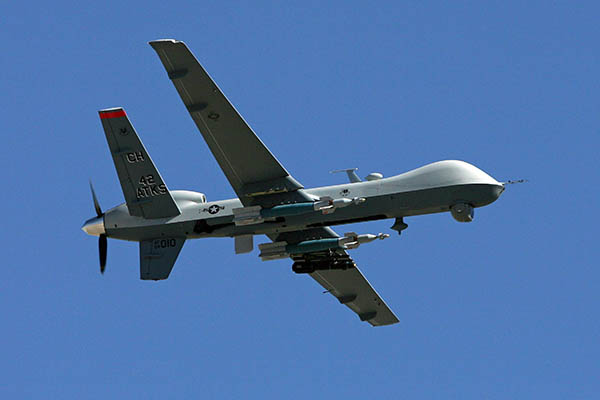
Ethan Miller—AFP
Foreign ministry statement says deaths of two Al Qaeda hostages in January strike exposes dangers of drone technology.
Pakistan said Friday the botched U.S. drone attack that killed two foreign hostages showed the risks of the controversial tactic, as details came to light apparently pinpointing the fatal strike.
President Barack Obama admitted on Thursday that one American and one Italian hostage were accidentally killed in a counter-terrorism operation in January targeting a suspected Al Qaeda hideout. Obama said U.S. consultant Warren Weinstein and Italian aid worker Giovanni Lo Porto were killed along with Ahmed Faruq, an American described as a leader of Al Qaeda in the Indian Subcontinent (AQIS).
Islamabad said it was shocked and saddened by the incident and offered sympathy to the families. “The death of Mr. Weinstein and Mr. Lo Porto in a drone strike demonstrates the risk and unintended consequences of the use of this technology that Pakistan has been highlighting for a long time,” the foreign ministry said in a statement.
The CIA’s drone campaign targeting Al Qaeda and Taliban militants in northwest Pakistan has long been highly controversial. Publicly Islamabad has regularly condemned it as counterproductive and a violation of sovereignty, though past Pakistani leaders are known to have approved some strikes.
The White House gave few details of this incident but it appears from an AQIS audio statement released earlier this month that it was a drone strike on Jan. 15 in North Waziristan, close to the Afghan border.
AQIS spokesman Usama Mahmood released an audio statement online on April 12 saying the group’s deputy leader Ahmed Farouq had been killed in a U.S. drone strike on Jan. 15. The statement said the strike took place in the Shawal area of North Waziristan. He did not refer to the two hostages, but only one U.S. drone strike was reported in Pakistan on that date.
He also described Farouq as Pakistani, rather than American, though it is possible he had dual nationality. Mahmood also said that U.S. drone strikes in recent months had killed 50 Al Qaeda members in Pakistan.
The bodies of those killed in drone strikes are usually badly damaged and quickly buried nearby by locals. This is likely to have happened with Farouq and the foreign hostages.
A source in a Pakistani militant group told AFP that in the Jan. 15 strike, missiles hit a mud house in Shawal, which lies on the border between North and South Waziristan. The area, off limits to foreign journalists, is hilly and densely forested, according to local residents. Fighters from the Pakistani Taliban and other militant groups have long taken advantage of this natural cover to use the area as a hideout.
The number of drone attacks in Pakistan has dropped sharply from a peak of 101 in 2010 to just 22 in 2014 and four so far this year, according to an AFP tally.
